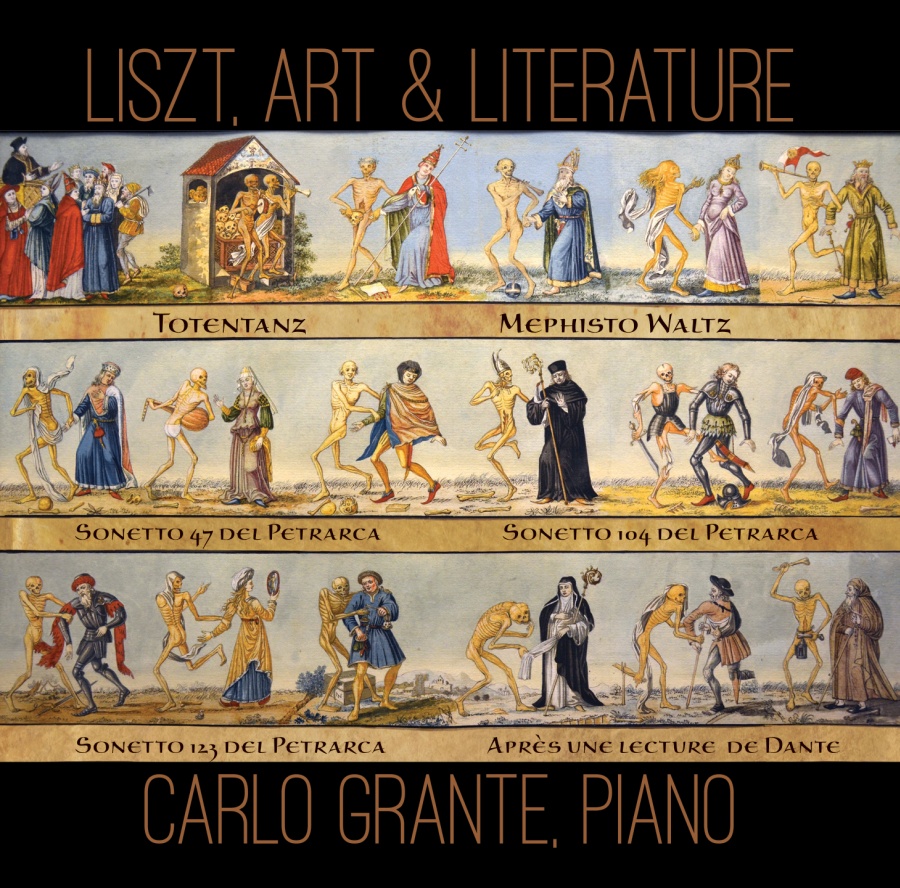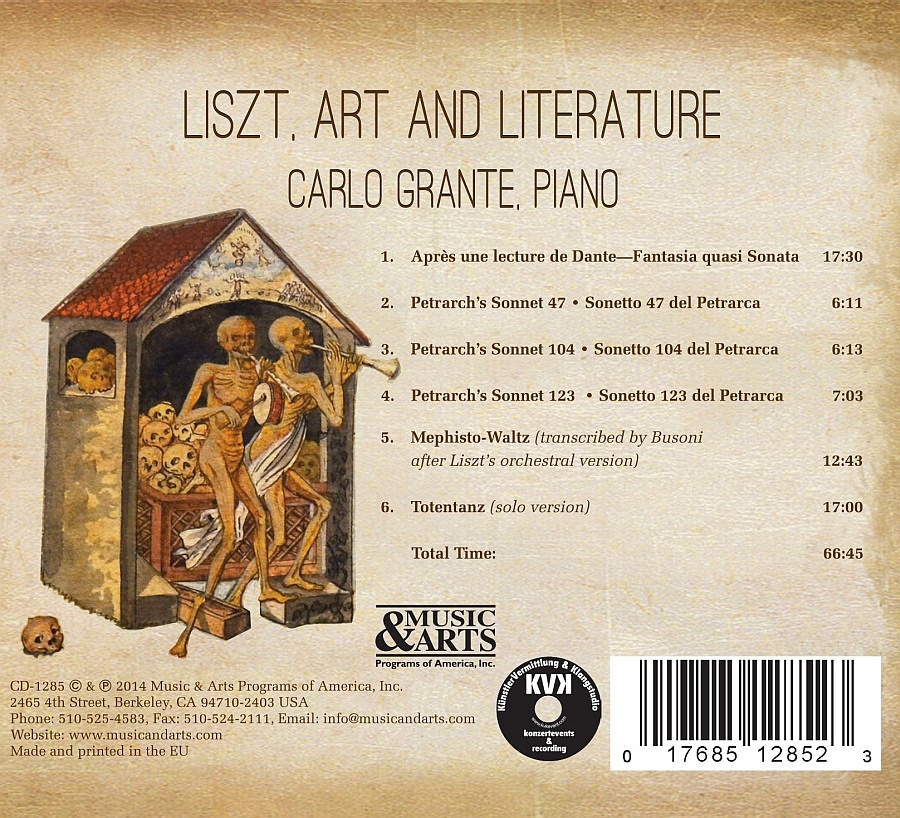
classical music distribution


(Produkt nie został jeszcze oceniony)
kompozytor
Liszt, Franz
tytuł
Liszt, Art & Literature
wykonawcy
Grante, Carlo
nr katalogowy
MACD-1285
opis
In the Romantic period, the connections between love and death were an obsession of artists. Composers were naturally drawn to explore the great themes that entered literature in the works of Dante, Petrarch and Goethe: good and evil, love and death. Liszt was no exception. The powerful, evocative works presented here range from moments of repose and contemplation to nearly unbearable contrasts of dynamics, pitch registers and tempi, dramatized by bold juxtapositions. “A fearless, flawless knight of the piano” is how Vienna’s Die Presse characterized pianist Carlo Grante.
• Liszt: Années de pèlerinage, 2ème année, Italie (7 pieces), S. 161
• Liszt: Après une lecture du Dante, fantasia quasi sonata (Années de pèlerinage II, S. 161 No. 7)
• Liszt: Canzonetta del Salvator Rosa (Années de pèlerinage II, S. 161 No. 3)
• Liszt: Il penseroso (Années de pèlerinage II, S. 161 No. 2)
• Liszt: Sonetto 104 del Petrarca (Années de pèlerinage II, S. 161 No. 5)
• Liszt: Sonetto 123 del Petrarca (Années de pèlerinage II, S. 161 No. 6)
• Liszt: Sonetto 47 del Petrarca (Années de pèlerinage II, S. 161 No. 4)
• Liszt: Sposalizio (Années de pèlerinage II, S. 161 No. 1)
• Liszt: Mephisto Waltz No. 1
• Liszt: Totentanz, S126 for piano & orchestra
Works:
• Liszt: Années de pèlerinage, 2ème année, Italie (7 pieces), S. 161
• Liszt: Après une lecture du Dante, fantasia quasi sonata (Années de pèlerinage II, S. 161 No. 7)
• Liszt: Canzonetta del Salvator Rosa (Années de pèlerinage II, S. 161 No. 3)
• Liszt: Il penseroso (Années de pèlerinage II, S. 161 No. 2)
• Liszt: Sonetto 104 del Petrarca (Années de pèlerinage II, S. 161 No. 5)
• Liszt: Sonetto 123 del Petrarca (Années de pèlerinage II, S. 161 No. 6)
• Liszt: Sonetto 47 del Petrarca (Années de pèlerinage II, S. 161 No. 4)
• Liszt: Sposalizio (Années de pèlerinage II, S. 161 No. 1)
• Liszt: Mephisto Waltz No. 1
• Liszt: Totentanz, S126 for piano & orchestra
nośnik
CD
gatunek
Muzyka klasyczna
producent
Music & Arts
data wydania
16-03-2015
EAN / kod kreskowy
017685128523

(Produkt nie został jeszcze oceniony)
cena 45,00 zł
lubProdukt na zamówienie
Wysyłka ustalana indywidualnie.
Darmowa wysyłka dla zamówień powyżej 300 zł!
Darmowy kurier dla zamówień powyżej 500 zł!
sprawdź koszty wysyłkiProduktu jeszcze nie zrecenzowano, chcesz być pierwszy?
Klienci, którzy kupili ten produkt, kupili również
Messiaen, Olivier
Messiaen: Et exspecto resurrectionem mortuorum, Le tombeau resplendissant, Hymne
8.572714
Corelli, Arcangelo
Mr Corelli in London - Sonatas Op. 5 & La Follia (CD + katalog)
HMX 2907523
Pozostałe płyty tego kompozytora
Liszt, Franz, Schumann, Robert, Knussen, Oliver
WYCOFANY Liszt: Sonata in B minor, Schumann: Humoresque, Knussen: Ophelia's Last Dance
MYR 005
Liszt, Franz
Liszt: Piano Music Vol. 30 - Soirées italiennes, 3 Paganini Etudes, Rossini and Spontini Impromptu, Rossini Variations
8.570984
różni kompozytorzy
My Personal B-A-C-H - Poulenc, Chopin, Prokofiev, Mozart, Liszt, Bach
98975
Liszt, Franz
Liszt: Complete Piano Music Vol. 43 - Transcriptions of Symphonic Poems
8.573485
Pozostałe płyty tego wykonawcy
Busoni, Ferruccio, Vlad, Roman
Busoni: Fantasia Contrappuntistica: Vlad: Opus Triplex
MACD-1186
Godowsky, Leopold
The Godowsky Edition Vol. 5 - Romantic Transcriptions and Arrangements
MACD-1189
Liszt, Franz
Liszt: Complete Piano Music Vol. 48 - Hungarian Rhapsodies Nos. 12-17
8.573784
Rachmaninov, Sergey
Rachmaninov: 13 Preludes; Variations On A Theme of Corelli; Isle of the Dead
MACD-1228
Napisz recenzję dla: Liszt, Art & Literature
Zapytaj o dostępność produktu
Twoje zapytanie:
Odpowiemy na adres:
Produkt został dodany do koszyka

Liszt, Franz
Liszt, Art & Literature
1 szt












































